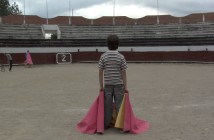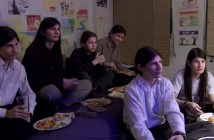
Cast: Adam Bakri, Leem Lubany, Iyad Hoorani
Director: Hany Abu-Assad
Country: Palestine
Genre: Drama | Thriller
Editor’s Notes: Omar is now out in limited theatrical release.
Most of my favorite films are able to explore (and in some cases exacerbate) the confines of cinematic space: Michelangelo Antonioni looked at the bourgeois ennui of L’Avventura (1960) by studying the spatial divisions between his characters; Chantal Akerman used an immobile camera to explore the oppressive spaces of the titular character in Jeanne Dielman (1975); and Alain Resnais repeatedly changed the location of Last Year at Marienbad (1961) in order to reflect the indecipherability of one man’s memory. Watching Hany Abu-Assad’s Omar (2013), I was taken aback by how the space informs much of the plot and narrative, adding another brilliant layer to this already tense thriller.
Watching Hany Abu-Assad’s Omar (2013), I was taken aback by how the space informs much of the plot and narrative, adding another brilliant layer to this already tense thriller.

Omar tells the story of the titular baker (Adam Bakri) who is imprisoned and harassed for his involvement in the murder of a soldier. As the occupational forces try to coerce Omar into revealing the whereabouts of his revolutionary friends, Omar’s personal relationships, especially his relationship with his girlfriend Nadia (Leem Lubany), are pushed to their limits. The film is not as straightforward as this synopsis appears: allegiances are tested, friendships are destroyed, the truth is never what it seems, and the nail-biting finale will leave your jaw on the floor…but I will avoid revealing any spoilers.
Omar is an extremely political film because it uses its story as a microcosm for an entire nation. The film is not black and white in its depiction of politics, but I am not the well qualified in giving an adequate analysis of the film’s exploration of the Israeli-Palestinian conflict. This is what led me to look at the visuals and how they convey the tension that Abu-Assad builds.
Omar is an extremely political film because it uses its story as a microcosm for an entire nation.
It is usually the reviewer’s duty to remark on the performances, script, narrative, and visuals to give the reader an understanding of whether or not he/she should see the film. I cannot help but spare the first three (which are all remarkable in their own right) in order to discuss the effective use of visual storytelling. Much in the same vein of Douglas Sirk and Carlos Saura’s subtextual visuals, Abu-Assad uses walls and “black holes” to inform much of the story. The film begins with Omar scaling a large wall in order to see his friend, and it ends with a meeting in an open air space. Throughout the film, the characters hide behind or transcend the multitude of partitions in order to create meaningful relationships (Omar is constantly hiding behind walls in order to give Nadia a letter). On the other hand, the prison interrogation scenes take place in “black holes” where space is barely defined and rarely explored. It is in these infinite and open spaces where the main violence takes place, lending the film to a multitude of subtextual political readings. Abu-Assad knows how to use space to his advantage, whether it is creating definite limits (as evidenced by Omar scaling the labyrinth of walls in order to shake the occupational forces) or by erasing the limits (Omar is tortured in a nebulous black hole). Abu-Assad’s storytelling is one that is seen repeatedly in the cinema of occupied/oppressed countries, but that does not diminish his effectiveness as a storyteller.
As a character study, Omar is brilliant in its ability to convey so much with its economics of space. I may not be well versed in politics, but my fluency in cinema made me appreciate how effective Omar was as a cinematic experience. Some may not agree with its depictions, while others may laud its politics, but if you open your eyes to everything Abu-Assad is showing you, you will realize what marvelous skills he possesses as a filmmaker. The old adage goes that “a picture is worth a thousand words,” and Abu-Assad made sure that this picture used those thousand words in the best way possible.
[notification type=”star”]89/100 ~ GREAT. Omar is a film about walls and “black holes.” Once you begin to read the visuals, you discover another level of this already brilliant film.[/notification]



